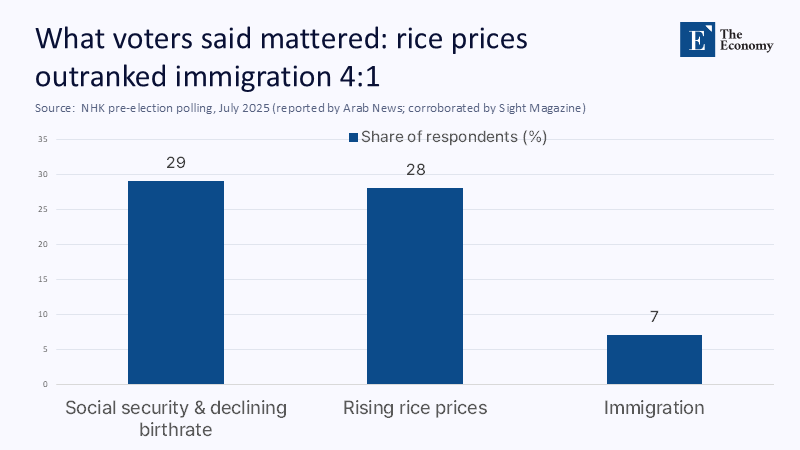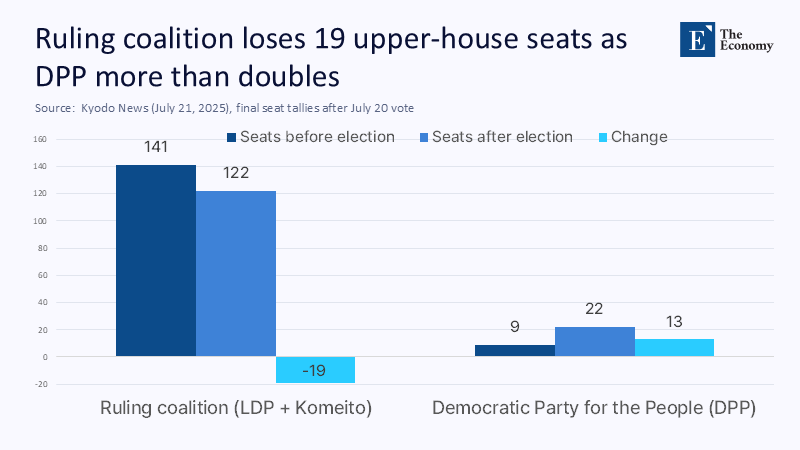Japan’s Populist Jolt Is About Prices and Trust—Not a Turn Against Foreigners
Input
Changed
This article was independently developed by The Economy editorial team and draws on original analysis published by East Asia Forum. The content has been substantially rewritten, expanded, and reframed for broader context and relevance. All views expressed are solely those of the author and do not represent the official position of East Asia Forum or its contributors.
In the final week before Japan’s July 20, 2025, Upper House election, NHK polling found that 28% of voters named soaring rice prices as a top concern; immigration ranked joint fifth at just 7%. In the same vote, the governing coalition lost its majority and a small right‑populist party vaulted from one to 14 seats in the 248‑member chamber—headline‑grabbing, yes, but still marginal in legislative heft. Rice prices have roughly doubled over the past year, the yen is weak, and core inflation has sat above the Bank of Japan’s 2% target for more than three years. Add a grinding political‑funding scandal and a prime minister fighting to keep his job, and the electoral arithmetic looks less like a xenophobic turn and more like a price‑shock verdict delivered to an enfeebled ruling party. The message from voters was not “keep foreigners out,” but “fix the economy and restore trust.”

Reframing the Moment: From Identity Panic to Economic Protest
The summer’s narrative has been too tidy: a country allegedly souring on foreigners suddenly elevates a “Japanese First” party. The vote’s mechanics tell a more prosaic story. A minority government already weakened by a 2024 lower‑house setback, a significant loss in the previous lower-house election, stumbled again, shedding its upper‑house majority. Prime Minister Shigeru Ishiba faced sliding approval and internal dissent even before ballots were cast, with investors and party elders openly questioning his staying power. In that context, discontent sought a vessel. It found one in right‑populists who promised tax relief, bigger benefits, and a restoration of order, less a coherent ideology than a protest slate braided to cost‑of‑living stress. Importantly, the party’s seat gain still leaves it a small force, while voter issue salience clustered around household economics, not identity. Interpreting the outcome as an anti‑foreigner pivot ignores the election’s baseline facts: price anxiety was ascendant; trust in the ruling party was brittle; leadership looked tentative.
Follow the Prices: The Political Arithmetic of Rice
When a staple’s price doubles, politics moves. In May and June, core inflation accelerated back above 3%, with food leading the climb and rice singled out in both reportage and polling. The government scrambled to release stockpiled rice and rework distribution from auctions to direct contracts, briefly shaving supermarket prices but leaving shelves thin and household budgets stretched. The farm ministry promised modernized crop monitoring to avoid misreads that amplified shortages, yet week‑to‑week declines still left prices far above 2024 levels. Methodologically, we treat the headline “rice doubled” as a conservative proxy for a broader food‑price shock, cross‑checking Tokyo CPI releases with national price data and validating with NHK’s issue ranking. Globally, FAO shows rice export prices easing year‑on‑year, underscoring that Japan’s spike was a domestic supply‑and‑pass‑through story, not simply imported inflation. In short, the election punished the government for a failure voters could taste three times a day.

Misinformation as Accelerator, Not Engine
The right‑populist campaign did not focus on policy details. It mastered the medium. Born on YouTube during the pandemic and amplified by COVID-19 conspiracy theories, false or misleading information related to the COVID-19 pandemic, its origins, prevention, diagnosis, and treatment, its network offered identity, community, and an always-on grievance machine. Researchers at Waseda and the University of Tokyo have mapped how vaccine skepticism and anti‑globalist frames migrated from fringe channels into electoral messaging; Reuters reported that the party’s YouTube following now outstrips the LDP’s severalfold. Yet the same Reuters analysis also shows that immigration was a lower‑tier voter concern next to rice and social security. The lesson is not that disinformation is harmless; it is that it rides prevailing discontent to scale. In 2025, the strongest current was economic: prices, wages, and pensions. Misinformation accelerated attention to “foreigners” at the margin, but the engine that drove votes was the cost‑of‑living squeeze combined with a trust shock born of money politics.
What the Numbers Say About Foreigners—and What Policy Is Doing
If Japan were pivoting decisively against foreigners, we would expect both attitudes and policy to harden in tandem. The data show a more nuanced trajectory. Foreign residents reached a record 3.77–3.78 million at end‑2024—about 3% of the population—driven by labor and student inflows as the economy reopened and the yen fell. Rather than shutting doors, policymaking has been inching toward managed openness: replacing the criticized Technical Intern Training Program with a skills‑development scheme that allows workplace changes; expanding pathways under the specified‑skilled worker visa; and instituting “complementary protection” to regularize status for people fleeing conflict. Some measures—like a new task force responding to complaints about over‑tourism or misuse of systems—reflect political pressure from the right. Still, the structural direction remains pragmatic accommodation to demographic and labor realities. The electorate may be ambivalent; the state is adjusting to dependence on foreign talent, not repudiating it.
Leadership, Not Nativism, Was on Trial
Japan’s system rewards strong intra‑party leadership that delivers stability in choppy waters. Voters did not see it. Opinion data in early July showed support for the ruling party slipping to lows not seen since 2012; by election night, the question in Tokyo was not ideological realignment but whether the premier could even survive the week. He has vowed to stay on, but market commentary and party chatter turned immediately to succession scenarios. In this light, the right‑populist advance reads as a classic second‑order protest against a tired brand rather than a resetting of national identity. Even the governing camp’s late‑cycle embrace of policies long demanded by the opposition—like scrapping a provisional gasoline tax—reads as an attempt to claw back trust on kitchen‑table issues. If the ruling party fields a leader with clarity, authority, and a mandate to tame prices and clean up funding practices, the political center can re‑cohere quickly.

Implications for Educators, Administrators, and Policymakers
For schools and universities, the priority is not to brace for a wave of xenophobic policy, but to plan for continuity in internationalization amid noisier politics. Foreign enrollment and hiring are still rising; institutions should expand Japanese-language support, improve campus mediation for cross-cultural frictions, and embed evidence-based media literacy in curricula that inoculate against conspiratorial content. Administrators need transparent, multilingual communication to international students and staff explaining local rule changes—on driver’s licenses, residency paperwork, or part‑time work—that may flow from central ministries reacting to public pressure. Policymakers should treat immigration‑adjacent controversies as symptoms, not causes. Address the price spike with targeted transfers, credible food‑supply management, and better data; restore public trust with rigorous political‑funding reform; and nominate leadership that can signal competence under pressure. Do that, and the oxygen for zero‑sum identity politics will thin—because the grievances it feeds upon will be measurably receding.
Anticipating the Critiques—and Rebutting Them
Critique one says that normalizing “Japanese First” rhetoric necessarily presages harsher treatment of foreigners. We should be clear‑eyed: the party’s surge has already tugged agendas rightward on symbolic issues. But electoral math still rewards moderation, and legislative arithmetic still constrains maximalist moves. With 14 seats, populists are agenda‑setters, not lawmakers of a new order. Critique two says that voters punished the government because they blamed foreigners for economic pain. The data disagree. The NHK issue ranking placed immigration well behind rice, pensions, and social security; Reuters’ pre‑ and post‑election coverage reinforced that hierarchy. Critique three predicts an enduring realignment. History suggests otherwise: when mainstream conservatives reassert competent leadership and deliver on prices, second‑order protest votes tend to ebb. The riskiest path is paralysis—hesitation on inflation relief and ethics reform—that leaves a vacuum for conspiratorial politics to fill. Energy flows where governance fails.
Re‑centering the Mandate
Return to the starting figure: 28% for rice, 7% for immigration. That ratio matters because it translates the election’s noise into a signal. Voters issued a practical mandate—to steady the basket, secure the pension, and prove that government can still do big, basic things well. The nationalist surge was real, but it was catalytic, not causative; it grew in the slipstream of inflation and mistrust. The path forward is not a tug‑of‑war over identity but a sprint to restore competence: tame staple prices with smarter reserves and crop data; enforce clean money in politics; and—in a system built on party leadership—select a standard‑bearer who can speak plainly and act decisively. Do those things, and the populist wave will subside into a rip current the mainstream can safely navigate. Fail, and we will misdiagnose a price shock as a cultural turn—and stumble through the next election still arguing with a mirage.
The original article was authored by Phillip Y Lipscy, a Professor of Political Science and Director of the Centre for the Study of Global Japan at the University of Toronto. The English version, titled "Japan’s upper house election delivers political uncertainty with big implications," was published by East Asia Forum.
References
Al Jazeera. (2025, Jul 20). Japan PM Ishiba says will stay in office after coalition’s election defeat.
AP News. (2024, Feb 9). Japan’s government OKs new foreign trainee program to attract more workers as its population shrinks.
Asahi Shimbun. (2025, July 13–14). Poll: LDP picked for all issues except ‘foreign resident policy’.
Asahi Shimbun. (2025, Jul 20). Ruling coalition on track for losing majority in Upper House.
Economist, The. (2025, Jul 21). Ishiba Shigeru’s premiership is crumbling.
FAO. (2025, July). FAO Food Price Index / Rice Price Update.
Immigration Services Agency of Japan / MOJ. (2023–2025). Complementary protection and foreign resident statistics (press materials).
Japan Times. (2025, Jul 21). Ruling bloc loses majority in Upper House after election.
Kyodo News. (2025, Mar 14). No. of foreign residents in Japan hits record high for 3rd year.
Kyodo News. (2025, Mar). Japan OKs policy for replacement of troubled foreign trainee scheme.
OECD. (2024). International Migration Outlook 2024: Japan.
Reuters. (2023–2025). Funding scandal explainer; arrests in LDP probe; polling and election coverage; inflation and rice prices; policy responses.
University of Tokyo. (2024). Anti‑vaccine conspiracies fuel divisive political discourse (press release).
Waseda University Institute for Advanced Study. (2025). From conspiracy theory movement to challenger party.
DW (Deutsche Welle). (2025, July 19 & 25). Far‑right parties play the immigration card ahead of vote; What is behind the rise of the ‘Japanese First’ far‑right?
Guardian, The. (2025, Jul 25). ‘Japanese First’: breakthrough by rightwing populists sparks fears of anti‑foreigner backlash in Japan.






















Comment